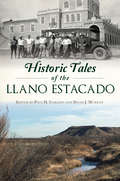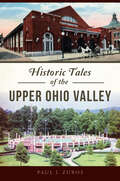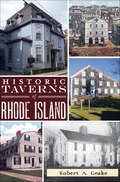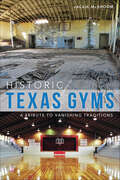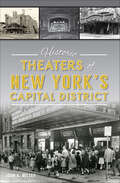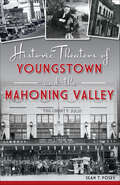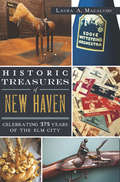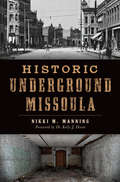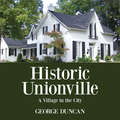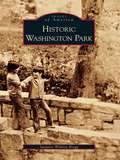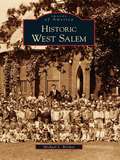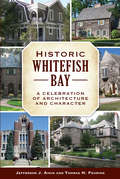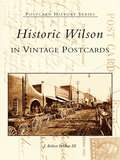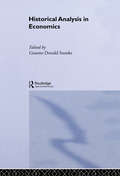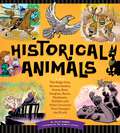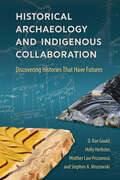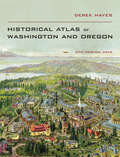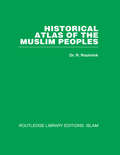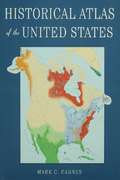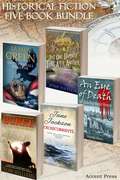- Table View
- List View
Historic Tales of the Llano Estacado (American Chronicles)
by David J. Murrah Paul H. CarlsonThe distinctive high mesa straddling West Texas and Eastern New Mexico creates a vista that is equal parts sprawling lore and big blue sky. From Lubbock, the area's informal capital, to the farthest reaches of the staked plains known as the Llano Estacado, the land and its inhabitants trace a tradition of tenacity through numberless cycles of dust storms and drought. In 1887, a bison hunter observed antelope, sand crane and coyote alike crowding together to drink from the same wet-weather lake. A similarly odd assortment of characters shared and shaped the region's heritage, although neighborliness has occasionally been strained by incidents like the 1903 Fence Cutting War. David Murrah and Paul Carlson have collected some three dozen vignettes that stretch across the uncharted terrain of the tableland's past.
Historic Tales of the Upper Ohio Valley (American Chronicles)
by Paul ZurosLocal historian Paul J. Zuros weaves a rich narrative of the region, reliving these tales as only a local can. The Upper Ohio River runs along the border between West Virginia and Ohio, where the cities of Weirton and Steubenville face each other across the flowing water. The history of these two municipalities has been intertwined from their earliest days. Discover stories of the early pioneers on both sides of the river and what they learned about their Native American predecessors. Tales of bygone celebrations will entertain, and rumors of local haunts will chill readers to the bone. The stories of these industrial centers as well as their preindustrial past will intrigue and delight young and old.
Historic Taverns of Rhode Island (Landmarks)
by Robert A. GeakeThis book chronicles a number of Rhode Island's historic taverns and the stories contained within their walls. Some of the taverns include: The Mowry Tavern, which was the site of political gatherings, protests and religious observances under Roger Williams; The Benedict Arnold Tavern built in 1693; The White Horse Tavern, which soon became the meeting place for Rhode Island legislators; and the Ruff Stone Tavern in North Providence was an establishment with a long history, having served as a pub, a stop on the Underground Railroad and a speakeasy during prohibition.
Historic Texas Gyms: A Tribute to Vanishing Traditions (Landmarks)
by Jackie McBroomFor generations of small-town Texans, the school gymnasium was the hub of the community. If it was a Tuesday night in Texline, most folks could be found in the old tin barn of a gym, rooting for their Tornadoes against the arch-rival Adrian Matadors. Transcending the role of a sports arena, the gym also provided a place to gather in celebration or shelter in crisis. Sadly, with the dramatic reduction of school districts around the state, many of the polished floorboards that once hosted graduations and beauty pageants now splinter beneath the weight of storage, farm equipment and guano-covered junk. From the pickup basketball game Elvis played in Hawkins to the tragic account of four Ennis war heroes, Jackie McBroom recounts stories from these beloved halls.
Historic Theaters of New York's Capital District (Landmarks)
by John A. MillerExperience the architecture and colorful history of the Historic Theaters of New York's Capital District as author John A. Miller charts the entertaining history.For generations, residents of New York's Capital District have flocked to the region's numerous theaters. The history behind the venues is often more compelling than the shows presented in them.John Wilkes Booth brushed with death on stage while he and Abraham Lincoln were visiting Albany. The first exhibition of broadcast television was shown at Proctor's Theater in Schenectady, although the invention ironically contributed to the downfall of theaters across the nation. A fired manager of the Green Street Theatre seized control of the theater with a group of armed men, but Albany police stormed the building and the former manager regained control.
Historic Theaters of Youngstown and the Mahoning Valley (Landmarks)
by Sean T. PoseyHistoric Theaters of Youngstown and the Mahoning Valley traces the evolution of modern cinema through the rich local history of the Mahoning Valley.From the days of the gaslit opera houses through the era of the drive-in, the Mahoning Valley's theatrical culture has thrived. The finest theaters in northeastern Ohio rose with the manufacturing might of the Steel Valley. The Warner brothers, who started their careers in Youngstown, opened their first theater in New Castle, Pennsylvania, and celebrities from Katharine Hepburn to Red Skelton graced local stages. The finest vaudevillians and the lovely ladies of burlesque were always a ticket away. Take a trip back to the Park Burlesque and the opulent Palace Theater and revisit the theater culture of Warren and Trumbull County. Author Sean T. Posey traces the evolution of modern cinema through the rich local history of the Mahoning Valley.
Historic Treasures of New Haven: Celebrating 375 Years of the Elm City
by Laura A. MacalusoFor more than two hundred years, New Haven, Connecticut, has had a particular proclivity for marking the passage of time. Residents of the Elm City celebrate their heritage in historic fashion, and they have carefully preserved fascinating relics from their city's past in local museums. Examine the first commemorative medal made for New Haven's 200th anniversary in 1838, which set the standard for Elm City celebrations. Other artifacts in the city's collections include a needlework picture mourning the death of George Washington, Noah Webster's dictionary notes for the letters "A" and "B" and the buckskin coat worn by explorer Henry Eld. Author Laura A. Macaluso chronicles the history of New Haven celebrations and prized artifacts in order to piece together the city's unique identity.
Historic Underground Missoula
by Dr Kelly Dixon Nikki M. ManningMuch of Missoula's history lies beneath the surface. As in many Old West cities, cavernous underground tunnel systems purportedly hid countless nefarious activities, from clandestine prostitution and Chinese opium dens to booze running during Prohibition. These sordid tales captivate today's residents and beg questions about the city's furtive past. Did local elite gentlemen mask their carnal habits there? Did John Wayne really use the passageways to run personal errands unnoticed? Author and urban archaeologist Nikki Manning ventures below to reconcile oral history with archaeological data in a fascinating exploration of Missoula's subterranean labyrinths.
Historic Unionville: A Village in the City
by George DuncanA guided tour of historic Unionville, a little Ontario village bursting with historic buildings full of stories. Unionville is a village in the city — an unexpected oasis where time seems to move a little more slowly than in the hectic world of condos, commercial strips, and traffic gridlock. Since the late 1960s, when Unionville and its vintage Main Street were “discovered,” the village has been a magnet for visitors. Historic Unionville is the first detailed exploration of the facts and folklore behind Unionville’s winding ways and eclectic architectural sights, which span two centuries from the Georgian to the Postmodern. Touring the heritage sites that still stand proudly in the community as signposts to the past, George Duncan brings to life stories of the people, places, and events behind this unique and inviting Ontario village.
Historic Washington Park
by Suzanne Wildrey BraggWashington Park and its neighborhood are steeped in history. When the Moravians settled in Salem in 1766, the hills to the south were used for hunting and, eventually, farming. In the late 1880s, when it became fashionable to build homes on elevated land, the bluffs became one of the most desirable residential areas to emerge in the early decades of Winston-Salem's boom. The plan for its development, built around the electric streetcar line, was designed by Jacob Lott Ludlow, who was also responsible for the West End plat. The Washington Park neighborhood became home to many of the area's wealthiest families, as well as the burgeoning middle class. Their lives, traditions, and habits helped shape the future of Winston-Salem. Today Washington Park is known for its grand mansions, nestled among the many bungalows, with superb views of downtown high-rises. The park, with its rolling hills and beautiful trails, provides a playground for the young and old alike. With the North Carolina School of the Arts located next door, the neighborhood is eclectic, elegant, and unique. This diversity has attracted a varied group of residents, all of whom share pride in their home, gardens, and noted creativity.
Historic West Salem (Images of America)
by Michael L. BrickerWest Salem is located in the southeast corner of Winston-Salem. It has the historical distinction of containing the land that made up the farms and industry of Colonial Salem. While East Salem, the congregational town and village, controlled business and religious interests, West Salem provided the heart, soul, and backbone of the area with the work of its blue-collar residents. The residents produced the food, mills, and industrial interests that allowed the town to function so successfully in its early years. Throughout West Salem's history, it always triumphed over such challenges as wars and the Great Depression. Images of America: Historic West Salem showcases the stories and photographs of the regular folks whose hard work and sacrifice fueled the greatness of our American leaders.
Historic Whitefish Bay: A Celebration of Architecture and Character
by Thomas Fehring Jefferson J. AikinIncorporated in 1892, Whitefish Bay is a pleasant, verdant village that is home to more than fourteen thousand people. More than half of its five thousand houses and other structures have been deemed historic or architecturally important. Even casual passersby can attest to the architectural significance of these buildings, and while the personal history attached to them is less apparent, it is no less dramatic. Their walls retain the stories of their remarkable inhabitants, from the outhouse where the first village president disappeared in 1899 with $20,000 in public funds to the lakeside Beaux-Arts mansion built by a Schlitz Brewing Company heir with eight varieties of Italian marble. Jefferson J. Aikin and Thomas H. Fehring examine these landmark treasures and the legacy of the residents they help preserve.
Historic Wilson in Vintage Postcards (Postcard History Series)
by J. Robert Boykin IIIWilson, North Carolina was formed in 1849 when the villages of Toisnot and Hickory Grove merged together. Named for Mexican War hero Gen. Louis D. Wilson, the new town came to be known for agriculture and education. The Wilson of today holds fast to its roots, offering antique shops laden with treasures from all walks of life and nationally recognized historic districts brimming with remarkable structures, significant styles of architecture, and numerous locations to taste the famed Eastern North Carolina style of barbecue. Historic Wilson in Vintage Postcards is a priceless collection of images that depict, among other views, the Wilson Depot from the late 1800s, local businesses, street scenes, churches, cotton and tobacco, and residential areas. The volume also affords readers postcards of Nash Street when it was considered "one of the most beautiful streets in America," tobacco scenes when Wilson was "the world's largest tobacco market," and the infamous 1911 trial of the Lewis West gang.
Historic Wonders: Legendary Temples
by Portrait AdvertisingThis book is a series that traces the enchanting and lesser known stories behind the creation of the well known temples, monuments and landmarks in India.
Historical Agency and the 'Great Man' in Classical Greece
by Sarah Brown FerrarioThe 'great man' of later Greek historical thought is the long product of traceable changes in ancient ideas about the meaning and impact of an individual life. At least as early as the birth of the Athenian democracy, questions about the ownership of the motion of history were being publicly posed and publicly challenged. The responses to these questions, however, gradually shifted over time, in reaction to historical and political developments during the fifth and fourth centuries BC. These ideological changes are illuminated by portrayals of the roles played by individuals and groups in significant historical events, as depicted in historiography, funerary monuments, and inscriptions. The emergence in these media of the individual as an indispensable agent of history provides an additional explanation for the reception of Alexander 'the Great': the Greek world had long since been prepared to understand him as it did.
Historical Analysis in Economics
by Graeme Donald SnooksNeo-classical economics is frequently criticised for paying inadequate attention to historical processes. However, it has proved easier to make broad claims that `history matters' than to theorise with any depth about the appropriate role for history in economic analysis. Historical Analysis in Economics considers what history can contribute to the science of economics: how would it matter if `history mattered?'
Historical Animals: The Dogs, Cats, Horses, Snakes, Goats, Rats, Dragons, Bears, Elephants, Rabbits and Other Creatures that Changed the World
by Julia MobergThroughout history, animals have shaped the world as we know it. But rarely have they received the recognition they deserve. Until now.This inside look at history’s most famous animals features wacky verse, cool facts, historical stats, and zany cartoon art. Meet Alexander the Great’s horse Bucephalus, who was his battle companion for nearly 30 years. Learn about Mozart’s starling bird that helped him write music by singing along as he composed. Read about the Ethiopian goats that discovered the coffee bean, Marco Polo seeing dragons in China, and a dog named Boatswain that saved Napoleon’s life. From the cobra that killed Cleopatra to Cairo, the dog that helped hunt down Osama bin Laden, Historical Animals has these stories and more!
Historical Archaeology and Indigenous Collaboration: Discovering Histories That Have Futures
by D. Rae Gould Holly Herbster Heather Law Pezzarossi Steve A. MrozowskiSociety for American Archaeology Scholarly Book AwardCollaborative archaeological projects focused on the Nipmuc people of New England that offer a model for research incorporating Indigenous knowledge and scholarship Highlighting the strong relationship between New England’s Nipmuc people and their land from the pre-contact period to the present day, this book helps demonstrate that the history of Native Americans did not end with the arrival of Europeans. This is the rich result of a twenty-year collaboration between indigenous and nonindigenous authors, who use their own example to argue that Native peoples need to be integral to any research project focused on indigenous history and culture. The stories traced in this book center around three Nipmuc archaeological sites in Massachusetts—the seventeenth century town of Magunkaquog, the Sarah Boston Farmstead in Hassanamesit Woods, and the Cisco Homestead on the Hassanamisco Reservation. The authors bring together indigenous oral histories, historical documents, and archaeological evidence to show how the Nipmuc people outlasted armed conflict and Christianization efforts instigated by European colonists. Exploring key issues of continuity, authenticity, and identity, Historical Archaeology and Indigenous Collaboration provides a model for research projects that seek to incorporate indigenous knowledge and scholarship.
Historical Atlas of Northeast Asia, 1590-2010: Korea, Manchuria, Mongolia, Eastern Siberia
by Robert Cribb Narangoa LiFour hundred years ago, indigenous peoples occupied the vast region that today encompasses Korea, Manchuria, the Mongolian Plateau, and Eastern Siberia. Over time, these populations struggled to maintain autonomy as Russia, China, and Japan sought hegemony over the region. Especially from the turn of the twentieth century onward, indigenous peoples pursued self-determination in a number of ways, and new states, many of them now largely forgotten, rose and fell as great power imperialism, indigenous nationalism, and modern ideologies competed for dominance.This atlas tracks the political configuration of Northeast Asia in ten-year segments from 1590 to 1890, in five-year segments from 1890 to 1960, and in ten-year segments from 1960 to 2010, delineating the distinct history and importance of the region. The text follows the rise and fall of the Qing dynasty in China, founded by the semi-nomadic Manchus; the Russian colonization of Siberia; the growth of Japanese influence; the movements of peoples, armies, and borders; and political, social, and economic developments—reflecting the turbulence of the land that was once the world's "cradle of conflict." Compiled from detailed research in English, Chinese, Japanese, French, Dutch, German, Mongolian, and Russian sources, the Historical Atlas of Northeast Asia incorporates information made public with the fall of the Soviet Union and includes fifty-five specially drawn maps, as well as twenty historical maps contrasting local and outsider perspectives. Four introductory maps survey the region's diverse topography, climate, vegetation, and ethnicity.
Historical Atlas of Washington and Oregon
by Derek HayesThis gorgeous atlas, illustrated throughout with more than 500 colorful images and maps, provides a visually rich and textually engaging history of the states of Oregon and Washington. Derek Hayes brings his enthusiasm and expertise to a full range of topics, beginning with the first inhabitants and tracing the westward expansion, conflict between settlers and Native Americans, and the establishment of the Oregon Trail. We see in vivid images, old maps, and lively text the coming of the railroads and the rapid establishment of the coastal ports, northwest cities and roads, the fur and lumber industries, and the large farms. We also witness the twentieth-century development of the war industries, the establishment of the aviation industry, and the celebratory 1962 Seattle World's Fair. At once a valuable reference and an exhilarating adventure through history, the Historical Atlas of Washington and Oregon presents readers with a fascinating chronicle of how these proud states came into their own and how they each look toward the future.
Historical Atlas of the Muslim Peoples
by R RoolvinkOriginally published in 1957. Within the compact range of fifty-six maps, this atlas depicts clearly and concisely the expansion of Islam outwards from the Arabian Peninsula and outlines the rise and decline of the various Muslim states and dynasties over a territory stretching from Spain to China. Maps have also been devoted to trade products and routes, both in the heartland of Islam and in the basins of the Indian Ocean and the Mediterranean Sea. This volume represents a series of maps which together present a full survey of the history of Islam in time and space.
Historical Atlas of the United States
by Mark C. CarnesDesigned for all libraries, this large-format, full-color atlas is an authoritative guide to the history of the United States. From the formation of the continent up through current events and information based on the most recent census, this work uses the geography of the United States to portray the history of the land and its people. The 300-plus maps tell the engaging story of America with detailed, clear information; accompanying text highlights key information presented in each map. An indispensable tool for students and educators alike, the Historical Atlas of the United States is destined to become a classic in the field.
Historical Box Set
by James Green Tom WilliamsFive full length novels from best-selling Historical fiction authors in one boxset Another Small Kingdom - James Green America was the land of the free - but could it stay that way? James Green uses fictional characters to illuminate the real events that lead to the birth of the American Intelligence Services and culminated in the extraordinary Louisiana Purchase, which doubled the size of the USA - at the cost of 3 cents an acre. Packed with action and fascinating historical detail, Another Small Kingdom will appeal both to those interested in the history of the USA and to aficionados of intelligent spy thrillers. Boston, 1802, Lawyer Macleod is a man full of hate, a dangerous man. When a newly arrived young lawyer is mad enough to insult him, the consequences spin out of control and Macleod is caught up in a web of danger and intrigue. With England at war with France, some powerful Americans feel that the USA's best chance of remaining independent is to throw in their lot with France- even if it means accepting a French king - for a while. To counter their plot, Macleod is sent toNew Orleans, where he meets Marie, wife of Etienne de Valois, aristocrat and fop, and through her learns a terrible secret. Together, unable to trust anyone, they race to uncover the traitors at the heart of the American Government. Just One Damned Thing After Another - Jodi Taylor "History is just one damned thing after another" - Arnold Toynbee A madcap new slant on history that seems to be everyone's cup of tea... Behind the seemingly innocuous façade of St Mary's, a different kind of historical research is taking place. They don't do 'time-travel' - they 'investigate major historical events in contemporary time'. Maintaining the appearance of harmless eccentrics is not always within their power - especially given their propensity for causing loud explosions when things get too quiet. Meet the disaster-magnets of St Mary's Institute of Historical Research as they ricochet around History. Their aim is to observe and document - to try and find the answers to many of History's unanswered questions...and not to die in the process. But one wrong move and History will fight back - to the death. And, as they soon discover - it's not just History they're fighting. Follow the catastrophe curve from eleventh-century London to World War I, and from the Cretaceous Period to the destruction of the Great Library at Alexandria. For wherever Historians go, chaos is sure to follow in their wake... Burke in the Land of Silver - Tom Williams The first instalment of Tom Williams' series His Majesty's Confidential Agent. A tale of spies and skulduggery in the Napoleonic Wars as Britain invades Argentina. James Burke joins the army determined to work his way up through the ranks and become a gentleman. He never set out to be a spy. But with Napoleon rampaging through Europe, the Duke of York needs agents and Burke is plucked from the infantry and sent on a mission to the Spanish colonial backwater of Argentina. His mission is to give the country's freedom fighters aid so that they may break free from Spanish rule at an opportune moment for Britain. Yet when Burke arrives, he finds himself falling in love, both with the Land of Silver, and Ana O'Gorman, lover of a rebel leader determined to bring about Burke's downfall... Crosscurrents - Jane Jackson Santo Innis is developing a revolutionary new engine to counter the lethal effects of high-pressure steam. His backer is Richard Vaughan, heir to Frederick Tregarron, owner of Gillyvean estate. Following the tragic deaths of his wife and baby son, Richard immersed himself in work. But his world is turned upside down by the unexpected arrival at Gillyvean of Melanie Tregarron, a talented artist and Frederick's illegitimate youngest daughter. Desperate to prove the viability of his invention, Santo persuades Richard to let him fit one at Gillyvean's brewhouse. But when Bronnen Jewell - worried about her mother's suffering at her father's hands - arrives to brew the harvest beer she's horrified, fearing loss of the i...
